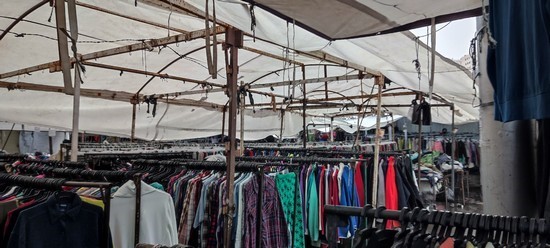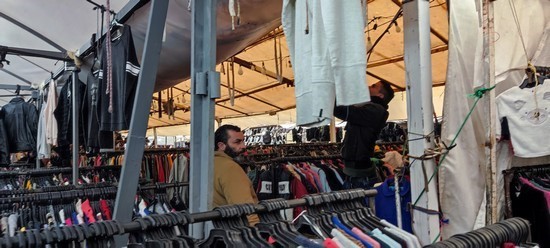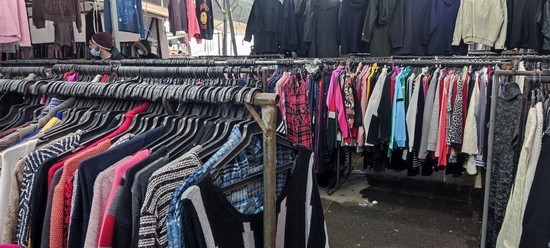Summer is in
full swing: outdoor markets and open
storefronts are buzzing with activity late
into the night. Amman features an overwhelming number of stores, many of which
offer tempting summer deals on brand new clothes. Here are a few important tips
for the ethically minded shopper to consider when trying to edge away from
retail stores and make their next clothing purchase a sustainable one.
اضافة اعلان
Secondhand, used,
restored
The most ethical choice when acquiring new clothes is to look for
secondhand options. Whether you tailor old items lying around or buy from a
secondhand outlet, both are great ways to reduce your waste generation.
The Ellen MacArthur
Foundation reported that the fashion industry is responsible for 10 percent of
all global carbon emissions, and 20 percent of the world’s wastewater according
to the UN Partnership on
Sustainable Fashion. Lowering your personal
consumption of new clothing is an integral part of making your wardrobe more
environmentally friendly.
When buying new clothes, look for retailers advertising themselves as handmade or locally made.
Additional benefits
are its cost efficiency. You can purchase used clothing and have them perfectly
tailored while spending less than you would at a retailer. If you are willing
to dig through used clothing at Friday Market, you will be surprised to stumble
upon an assortment of name brand items.
Materials matter
Clothes both new and used have a time for retirement. The worst option
will always be throwing them in the trash. When you get rid of clothing that is
in decent shape, consider donating to one of Jordan’s clothing recycling stores
like the Charity Clothing Bank.
 (File photos: Ameer Khalifeh/Jordan News)
(File photos: Ameer Khalifeh/Jordan News)
In the case of
organic materials — such as wool, cotton, linen, silk, and bamboo — you can cut
garments into pieces and compost them. Any organic textiles can be turned into
soil, resulting in less waste at local landfills. Be sure to remove any
non-organic materials which will end up as unsightly pollutants in your
compost. Also, never let textiles exceed more than 25 percent of the volume of
your compost lest you hamper the effectiveness of the decomposition process.
To dispose of
inorganic materials, the process is more difficult. Commonly used synthetic
textiles are made from
petrochemicals: acrylic, nylon, polyester,
polypropylene, polyvinyl chloride, and spandex. Your aim should be to find an
appropriate recycling plant. Amman has several recycling facilities that work
with plastics, but textiles can be tricky because of the blend of materials and
components that make up a garment. These materials are not meant to degrade
naturally and will eventually cause pollutants to seep into the soil and
groundwater if disposed of in a landfill. To achieve sustainability, it is best
to avoid purchasing these materials when possible.
Buy local
Whether it is for work or a wedding, secondhand stores do not always have
the specific items you need. When buying new clothes, look for retailers
advertising themselves as handmade or locally made. According to the World
Bank, the Kingdom has a strong clothing sector; the country makes 27 percent of
its export earnings from it. By purchasing clothes manufactured locally, you
reduce your carbon footprint and support Jordanian businesses. Buying clothes
made abroad comes with a certain uncertainty regarding worker conditions and
the environmental impact of shipping.
Any organic textiles can be turned into soil, resulting in less waste at local landfills.
A great collection
of home goods and clothing can be found at the online vendor
thelocalconcept.com. They curate a collection of locally made clothing that
deliver all over the country.
Local spotlight
Help support local businesses while gaining maximum value on your
purchases. Below are some ethical vendors selling sustainable clothing for
great prices!

Open from Thursday
to Friday, Friday Market is one of the largest open-air markets in Amman. Used
clothing vendors bring in new items every week and sell them at a fraction of
their retail price. Shirts, hats, and trousers are often sold from JD1–5 near
Ras Al-Ain, south of the downtown markets. Coming late on a Friday means most
of the options will have been picked through by crowds looking for the best
fashion treasures Amman’s secondhand market has to offer. So the earlier you
show up, the better.
Support a local
child enrichment and education project while buying new clothes. Located in
Jabal Luweibdeh, Orenda Tribe sells high quality shirts made from organic
materials. Their clothing sales drive community education programs centered on
art and the environment. Designs are created by the children who benefit from
these programs.

Second Base caters
to secondhand shoppers who don’t want to scour for high fashion pieces. This
charitable organization is a clothing outlet with sales that support
FabricAID,
a nonprofit with outlets that provide cheap clothing to disadvantaged
communities. Second Base takes vintage clothes and fixes them to provide a
curated selection of affordable, high fashion pieces.
Don’t forget!
If you are ready to take the next steps to becoming an ethical consumer,
remember to buy secondhand first and foremost. Keep organic materials in mind
to make sure that your clothes are ecofriendly. And shop local to support
Jordanian businesses and minimize the environmental impact of shipping.
Read more Fashion
Jordan News



